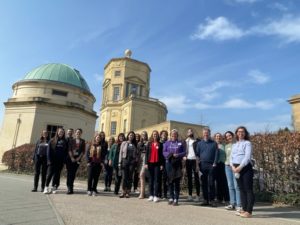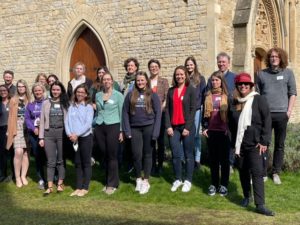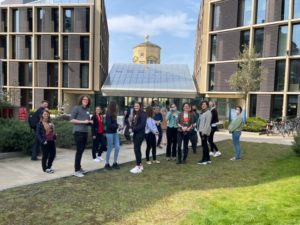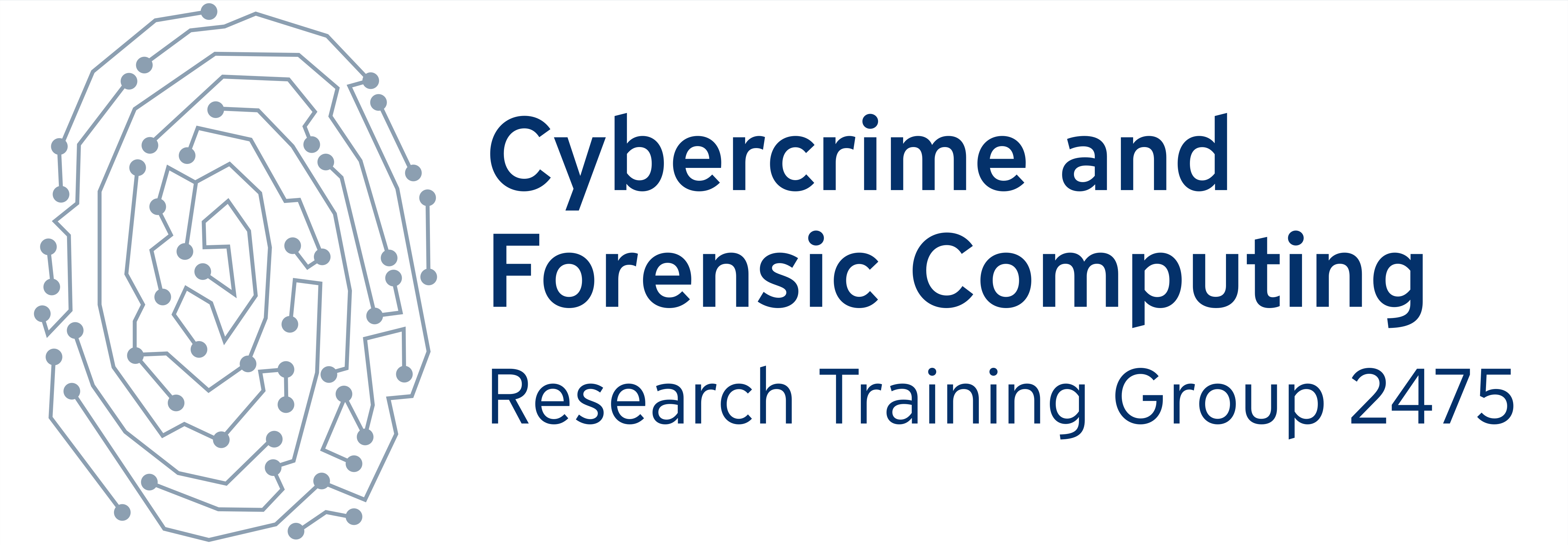Women in Forensic Computing Workshop 2022
Women in Forensic Computing Workshop and Bootcamp
held in in cooperation with DFRWS EU 2022 on March 28, 2022
This bootcamp/workshop was held physically at the Mathematical Institute of the University of Oxford, UK, and virtually on Monday, March 28, 2022 and was associated with the Digital Forensic Research Conference Europe (DFRWS EU), an academic conference in the area of digital forensic science which began on March 29 and ended on March 31, 2022. The workshop was part of a workshop series that started in 2019.
Post-Workshop Update: Thanks for Participating



Overall 49 participants had registered to the workshop (43 female, 6 male), 26 attended virtually and 23 attended in-person and took a group photo in front of the Radcliffe Observatory in the sunshine of the workshop day. With 21 participants, Germany was the country with most participants, followed by the UK with 12. Most of the participants (40) had an academic affiliation. All enjoyed the possibility to discuss topics related to the workshop and extend personal networks. Thanks to all who participated and the members of the organizing committee for the preparation. Presentation slides have been added to the programme below. We wish to see all of you again at the next event in this series.
Background
Digital forensic science is the application of scientific methods of computing in order to recover and investigate evidence found in digital devices, often in relation to computer crime. Digital evidence is increasingly important in almost all types of juridical proceedings, mainly due to the increasing volume and quality of digital evidence.
The objective of this workshop is to increase the interest of students and academically young researchers in digital forensic science as a career field or a research field. Another aim of this workshop is to increase awareness and appreciation of the achievements of women in the area of forensic computing/digital forensics and therefore this workshop wishes to be a forum to help women build their technical confidence and thereby attract more female researchers to the field.
The workshop included a sequence of presentations that introduce some fundamental and current topics of the field and allows for first-hand hands-on experience.
Workshop Location
Mathematical Institute, University of Oxford
Andrew Wiles Building
Radcliffe Observatory Quarter (550)
Woodstock Road
Oxford, OX2 6GG
Seminar Room L4 L3
Final Programme (with links to slides)
Monday, March 28, 2022 (all times are local British Summer Time, BST)
Seminar Room L4 L3
10:00 Welcome to Oxford (Chris Hargreaves), Welcome to WinFC (Felix Freiling) and introductory round
10:15 Keynote presentation by Katrin Franke (NTNU), cancelled due to illness, remaining programme rearranged
10:30 Invited presentation session, part 1, session chair: Maike Raphael
- Mariya Shafat (University of Kashmir): „Digital Forensics Research: A Roadmap“ (virtual presentation), [slides]
11:15 Coffee break
11:30 Invited presentation session, part 2, session chair: Maike Raphael
- Svenja Mischur (intersoft consulting services AG, Hamburg, Germany) and Christian Müller (Trufflepig IT-Forensics GmbH, Pfaffenhofen an der Ilm, Germany): „Incident Response and Memory Forensics“ (hybrid presentation), [slides]
12:15 Lunch break and networking
13:45 Participant presentation session 1 (*), session chair: Mamoqenelo Morolong
- Manon Fischer: Distant traces and their use in crime scene investigation, [slides]
- Radina Stoykova: Reliability of digital forensics for criminal investigations, [slides]
- Laura Bachňáková Rózenfeldová: Analysis of Digital Evidence Application by National Courts. [slides]
14:45 Coffee break
15:00 Participant presentation session 2 (*), session chair: Radina Stoykova
- Eva Marková: Searching for relationships between forensic artifacts and their attributes, [slides]
- Christa Miller: Media Coverage Needs YOU! (virtual presentation), [slides]
- Daryl Pfeif: Interactive Demo of the Cyber Sleuth Science Lab (CSSL)
16:00 Coffee break
16:30 Hands-on session on incident response and memory forensics with Svenja Mischur (intersoft consulting services AG, Hamburg, Germany) and Christian Müller (Trufflepig IT-Forensics GmbH, Pfaffenhofen an der Ilm, Germany), details see below
18:00 End of workshop
* Participant presentations have a talk slot of 20 minutes and can decide themselves how much time they wish to spend on presentation and how much on discussion.
Presentations will be in-person unless noted as „virtual presentation“. For „hybrid presentations“, some of the speakers will present in-person.
Call for Participation
Participation in the workshop is limited. To participate, send a one-page letter describing your current affiliation, your research interests, why the workshop is interesting to you and whether you wish to participate in-person or online via email to <women-in-forensic-computing@lists.informatik.uni-erlangen.de> by February 21, 2022. Applications after that date are also possible but will be handled on a first-come first-serve basis.
Workshop participation is free of charge and open to both male and female participants. We also offer several scholarships (sponsored by FAU) for female students who wish to participate in the workshop: The scholarship covers the attendance fee for the DFRWS EU 2022 conference and may also partially cover travel expenses. To apply for such a scholarship, please indicate this in your application email.
Participant Presentations
Participants of the workshop also had the opportunity to apply for a slot to present their current research or insights into the profession in the field of digital forensics in a ~15-minute talk at the workshop. Interested applicants had to send the title and an abstract of their presentation proposal together with the registration (see above) by February 21, 2022 (deadline has passed). There was a lightweight selection process on presentations by the organizing committee. The selected presentations are included in the programme above.
Presentations were delivered on-site or online. Presentations should include one slide to motivate why digital forensics is an interesting field.
Hands-On Session
Together we will work on an incident response case and reconstruct what happened. We will also see how important memory forensics are in incident response cases and what information can be gathered here. Furthermore, we will give tips on how you can practice with open source tools.
Participants need a Windows operating system and should download the provided images and tools in advance. Download location will be sent to participants via email.
Organizing Committee
- Felix Freiling, FAU, Germany
- Yasin Köse, FAU, Germany
- Daryl Pfeif
- Svenja Mischur, intersoft consulting services AG, Hamburg, Germany
- Mamoqenelo Morolong, Botho University – Maseru Campus and Namibia University of Science and Technology
- Theresa Müller
- Maike Raphael
- Sophia Seubert
- Mariya Shafat, University of Kashmir, India
- Radina Stoykova
- Lena Voigt, FAU, Germany
Artwork and T-Shirt
Feel free to use the workshop logo on your presentation slides or on social media to spread the word.
You may also visit the workshop webshop to order the official workshop t-shirt and other merchandise.
Contact
Contact the organizers via email at <women-in-forensic-computing@lists.cs.fau.de>
Thanks
This workshop series is supported by the office of Gender and Diversity of Friedrich-Alexander-Universität (FAU) and by Deutsche Forschungsgemeinschaft (DFG, German Research Foundation) as part of the Research and Training Group 2475 „Cybercrime and Forensic Computing“ (grant number 393541319/GRK2475/1-2019).
